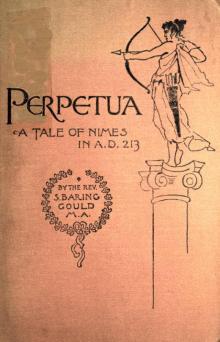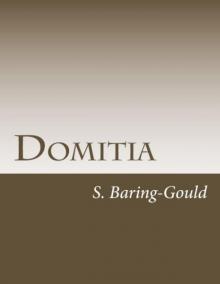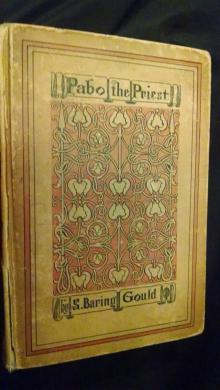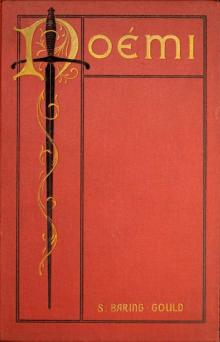- Home
- S. Baring-Gould
Pabo, the Priest: A Novel
Pabo, the Priest: A Novel Read online
Produced by sp1nd, Mary Meehan and the Online DistributedProofreading Team at https://www.pgdp.net (This file wasproduced from images generously made available by TheInternet Archive)
PABO, THE PRIEST
A Novel
BY S. BARING GOULD
Author of "Domitia," "The Broom-Squire," "Bladys," "Mehalah," Etc.
NEW YORK FREDERICK A. STOKES COMPANY PUBLISHERS
Copyright, 1899, BY FREDERICK A. STOKES COMPANY
CONTENTS
CHAPTER PAGE
I. GERALD 1
II. NEST 14
III. THE SEVEN DEGREES 23
IV. A HWYL 38
V. THE FIRST BLOOD 48
VI. THE SCROLL 58
VII. GRIFFITH OF RHYS 66
VIII. PREPARING FOR THE EVIL DAY 74
IX. WHAT MUST BE 83
X. THE CELL ON MALLAEN 93
XI. A MIRACLE 104
XII. GORONWY 117
XIII. IT MUST BE MAINTAINED 129
XIV. THE FALL OF THE LOT 140
XV. TWO PEBBLES 152
XVI. A SUMMONS 162
XVII. BETRAYED 172
XVIII. CAREG CENNEN 183
XIX. FORGOTTEN 194
XX. THE BRACELET OF MAXEN 206
XXI. SANCTUARY 217
XXII. IN OGOFAU 228
XXIII. AURI MOLES PRAEGRANDIS 238
XXIV. THE PYLGAIN OF DYFED 251
XXV. THE WHITE SHIP 261
PABO, THE PRIEST
CHAPTER I
GERALD
King Henry sat in a great chair with a pillow under each arm, and onebehind his head resting on the lofty chair-back. He was unwell,uncomfortable, irritable.
In a large wicker-work cage at the further end of the room was aporcupine. It had been sent him as a present by the King of Denmark.
Henry Beauclerk was fond of strange animals, and the princes thatdesired his favor humored him by forwarding such beasts and birds asthey considered to be rare and quaint.
The porcupine was a recent arrival, and it interested the King as a newtoy, and drew his thoughts away from himself.
He had occasion to be irritable. His leech had ordered him to eat saltpork only.
By his hand, on the table, stood a ewer and a basin, and ever and anonHenry poured water out of the ewer into the basin, and then with a hugewooden spoon ladled the liquid back into the receiver. The reason of theproceeding was this--
He had for some time been troubled with some internal discomfort--notserious, but annoying; one which we, nowadays, would interpret verydifferently from the physicians of the twelfth century. We should saythat he was suffering from dyspepsia; but the Court leech, who diagnosedthe condition of the King, explained it in other fashion.
He said that Henry had inadvertently drunk water that contained thespawn of a salamander. It had taken many months for the spawn to developinto a sort of tadpole, and the tadpole to grow into a salamander. Thusthe reptile had attained large size, and was active, hungry, andrampageous. Beauclerk had a spotted salamander within him, which couldnot be extracted by a forceps, as it was out of reach; it could not bepoisoned, as that medicament which would kill the brute might also killthe King. It must, therefore, be cajoled to leave its prison. Unlessthis end were achieved the son of the Conqueror of England would succumbto the ravages of this internal monster.
The recipe prescribed was simple, and commended itself to the meanestintelligence. Henry was to eat nothing but highly salted viands, and wasto drink neither wine, water, nor ale. However severely he might sufferfrom thirst he could console himself with the reflection that thesufferings of the salamander within him were greater--a poor comfort,yet one that afforded a measure of relief to a man of a vindictive mind.
Not only was he to eat salt meat, but he was also to cause the splash ofwater to be heard in his insides. Therefore he was to pour waterforwards and backwards between the ewer and the basin; and this was tobe done with gaping mouth, so that the sound might reach the reptile,and the salamander would at length be induced to ascend the throat ofthe monarch and make for the basin, so as to drink. Immediately on theintruder leaving the body of the King, Henry was to snap it up with apair of tongs, laid ready to hand, and to cast it into the fire.
Although the season was summer and the weather was warm, there burnedlogs on the hearth, emitting a brisk blaze.
There were in the room in the palace of Westminster others besides theKing and the imprisoned salamander. Henry had sent into South Wales forGerald de Windsor and his wife Nest. These two were now in the chamberwith the sick King.
"There, Nest," said he, "look at yon beast. Study it well. It is calleda porcupine. Plinius asserts--I think it is Plinius--that when angeredhe sets all his quills in array and launches one at the eyes of such asthreaten or assail him. Therefore, when I approach the cage, I carry abolster before me as a buckler."
"Prithee, Sire, when thou didst go against the Welsh last year, didstthou then as well wear a bolster?"
"Ah," said the King, "you allude to the arrow that was aimed at me, andwhich would have transfixed me but for my hauberk. That was shot by noWelshman."
"Then by whom?"
"Odds life, Nest, there be many who would prefer to have the light andlax hand of Robert over them than mine, which is heavy, and gripstightly."
"Then I counsel, when thou warrest against the Welsh, wear a pillowstrapped behind as well as one before."
"Nest! Thy tongue is sharp as a spine of the porcupine. Get thee goneinto the embrasure, and converse with the parrot there. Gerald and Ihave some words to say to each other, and when I have done with him,then I will speak with thee."
The lady withdrew into the window. She was a beautiful woman, known tobe the most beautiful in Wales. She was the daughter of Rhys, King ofDyfed--that is, South Wales, and she had been surrendered when quiteyoung as a hostage to Henry. He had respected neither her youth nor herhelpless position away from her natural protectors. Then he had thrusther on Gerald of Windsor, one of the Norman adventurers who were turnedloose on Wales to be the oppressors, the plunderers, and the butchers ofNest's own people.
Nest had profuse golden hair, and a wonderful complexion of lilies androses, that flashed, even flamed with emotion. Her eyes were large anddeep, under dark brows, and with long dark lashes that swept her cheeksand veiled her expressive eyes when lowered. She was tall and willowy,graceful in her every movement. In her eyes, usually tremulous and sad,there scintillated a lurking fire--threats of a blaze, should she beangered. When thrown into the arms of Gerald, her wishes had not beenconsulted. Henry had desired to be rid of her, as an encumbrance, assoon as he resolved on marrying Mathilda, the heiress of the Saxonkings, daughter of Malcolm of Scotland, and niece to Edgar Etheling. Atone time he had thought of conciliating the Welsh by making Nest hiswife. Their hostility would cease when the daughter of one of theirprinces sat on
the English throne. But on further consideration, hedeemed it more expedient for him to attach to him the English, and sorally about him a strong national party against the machinations of hiselder brother, Robert. This concluded, he had disposed of Nest,hurriedly, to the Norman Gerald.
Meanwhile, her brother, Griffith, despoiled of his kingdom, a price seton his head, was an exile and a refugee at the Court of the King ofGwynedd, or North Wales, at Aberfraw in Anglesey.
"Come now, Gerald, what is thy report? How fares it with thepacification of Wales?"
"Pacification, Lord King! Do you call that pacifying a man when youthrash his naked body with a thorn-bush?"
"If you prefer the term--subjugation."
"The word suits. Sire, it was excellent policy, as we advanced, to fillin behind us with a colony of Flemings. The richest and fattest land hasbeen cleared of the Welsh and given to foreigners. Moreover, by thismeans we have cut them off from access to the sea, from their greatharbors. It has made them mad. Snatch a meal from a dog, and he willsnarl and bite. Now we must break their teeth and cut their claws. Theyare rolled back among their tangled forests and desolate mountains."
"And what advance has been made?"
"I have gone up the Towy and have established a castle at Carreg Cennen,that shall check Dynevor if need be."
"Why not occupy Dynevor, and build there?"
Gerald looked askance at his wife. The expression of his face said morethan words. She was trifling with the bird, and appeared to pay noattention to what was being said.
"I perceive," spoke Henry, and chuckled.
Dynevor had been the palace in which Nest's father, the King of SouthWales, had held court. It was from thence that her brother Griffith hadbeen driven a fugitive to North Wales.
"In Carreg Cennen there is water--at Dynevor there is none," saidGerald, with unperturbed face.
"A good reason," laughed Henry, and shifted the pillow behind his head."Hey, there, Nest! employ thy energies in catching of flies. Methinkswere I to put a bluebottle in my mouth, the buzzing might attract thesalamander, and I would catch him as he came after it." Then to Gerald,"Go on with thine account."
"I have nothing further to say--than this."
He put forth his hand and took a couple of fresh walnuts off a leaf thatwas on the table. Then, unbidden, he seated himself on a stool, with hisback to the embrasure, facing the King. Next he cracked the shells inhis fist, and cast the fragments into the fire. He proceeded leisurelyto peel the kernels, then extended his palm to Henry, offering one, butholding his little and third finger over the other.
"I will have both," said Beauclerk.
"Nay, Sire, I am not going to crack all the nutshells, and you eat allthe kernels."
"What mean you?"
"Hitherto I and other adventurers have risked our lives, and shed ourblood in cracking the castles of these Welsh fellows, and now we wantsomething more, some of the flesh within. Nay, more. We ask you to helpus. You have done nothing."
"I led an army into Wales last summer," said Henry angrily.
"And led it back again," retorted Windsor drily. "Excuse my bluntness.That was of no advantage whatsoever to us in the south. Your forces werenot engaged. It was a promenade through Powys. As for us in the south,we have looked for help and found none since your great father made apilgrimage to St. David. Twice to Dewi is as good as once to Rome, sothey say. He went once to look around him and to overawe those mountainwolves."
"What would you have done for you?" inquired Henry surlily.
"Not a great thing for you; for us--everything."
"And that?"
"At this moment a chance offers such as may not return again in ourtime. If what I propose be done, you drive a knife into the heart of theenemy, and that will be better than cutting off his fingers and toes andslicing away his ears. It will not cost you much, Sire--not the risk ofan arrow. Naught save the stroke of a pen."
"Say what it is."
"The Bishop of St. David's is dead, a Welsh prelate, and the Churchthere has chosen another Welshman, Daniel, to succeed him. Give the seeto an Englishman or a Norman, it matters not which--not a saint, but afellow on whom you can rely to do your work and ours."
"I see not how this will help you," said Henry, with his eye on the hardface of Gerald, which was now becoming animated, so that the bronzecheek darkened.
"How this will help us!" echoed Windsor. "It will be sovereign as help.See you, Sire! We stud the land with castles, but we cannot beeverywhere. The Welsh have a trick of gathering noiselessly in the woodsand glens and drawing a ring about one of our strongholds, and lettingno cry for assistance escape. Then they close in and put everyEnglishman therein to the sword--if they catch a Fleming, him they hangforthwith. We know not that a castle has been attacked and taken till wesee the clouds lit up with flame. When we are building, then our convoysare intercepted, our masons are harassed, our limekilns are destroyed,our cattle carried off, our horses houghed, and our men slaughtered."
"But what will a bishop avail you in such straits?"
"Attend! and you shall hear. A bishop who is one of ourselves and not aWelshman drains the produce of the land into English pockets. He willput an Englishman into every benefice, that in every parish we may havea spy on their actions, maintained by themselves. There is the joke ofit. We will plant monasteries where we have no castles, and stuff themwith Norman monks. A bishop will find excuses, I warrant you, fordispossessing the native clergy, and of putting our men into theirberths. He will do more. He will throw such a net of canon law over thelaity as to entangle them inextricably in its meshes, and so enable us,without unnecessary bloodshed, to arrogate their lands to ourselves."
Henry laughed.
"Give us the right man. No saint with scruples."
"'Sdeath!" exclaimed the King; "I know the very man for you."
"And he is?"
"Bernard, the Queen's steward."
"He is not a clerk!"
"I can make him one."
"He is married!"
"He can cast off his wife--a big-mouthed jade. By my mother's soul, hewill be glad to purchase a bishopric so cheap."
"He is no saint?"
"He has been steward to one," mocked Henry. "My Maude postures as asaint, gives large alms to needy clerks, washes the feet of beggars,endows monasteries, and grinds her tenants till they starve, break outinto revolt, and have to be hung as an example. She lavishes coin onforeign flattering minstrels--and for that the poor English churl mustbe put in the press. It is Bernard, and ever Bernard, who has to turnthe screw and add the weights and turn the grindstone."
"And he scruples not?"
"Has not a scruple in his conscience. He cheats his mistress of a thirdof what he raises for her to lavish on the Church and the trumpeters ofher fame."
"That is the man we require. Give us Bernard, and, Sire, you will domore to pacify Wales--pacify is your word--than if you sent us an army.Yet it must be effected speedily, before the Welsh get wind of it, orthey will have their Daniel consecrated and installed before we shall beready with our Bernard."
"It shall be accomplished at once--to-morrow. Go, Gerald, make inquirywhat bishops are in the city, and send one or other hither. He shallpriest him to-morrow, and Bernard shall be consecrated bishop the sameday. Take him back with you. If you need men you shall have them.Enthrone him before they are aware. They have been given Urban atLlandaff, and, death of my soul! he has been belaboring his flock withhis crook, and has shorn them so rudely that they are bleeding to death.There is Hervey, another Norman we have thrust into St. Asaph, and, if Imistake not, his sheep have expelled their shepherd. So, to supportBernard, force will be required. Let him be well sustained."
"I go," said Gerald. "When opposition is broken we shall eat our walnutstogether, Sire."
"Aye--but Bernard will take the largest share."

 Perpetua. A Tale of Nimes in A.D. 213
Perpetua. A Tale of Nimes in A.D. 213 Domitia
Domitia Pabo, the Priest: A Novel
Pabo, the Priest: A Novel Noémi
Noémi The Book of Were-Wolves
The Book of Were-Wolves